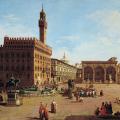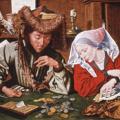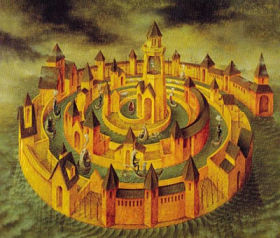353. The Good Place: Utopias in the Italian Renaissance
Tommaso Campanella’s The City of the Sun and other utopian works of the Italian Renaissance describe perfect cities as an ideal for real life politics.
Themes:
• D.J. Donno (trans.), Tommaso Campanella: The City of the Sun (Berkeley: 1981).
• A. Donato (trans.), Italian Renaissance Utopias: Doni, Patrizi, and Zuccolo (New York: 2019).
---
• P.R. Blum, “The Economy of Slavery in Campanella’s Political Thought,” Bruniana & Campanelliana 23 (2017), 563-72.
• A. Cameron, “Doni’s satirical utopia,” Renaissance Studies 10 (1996), 462-73.
• M. Eliav-Feldon, Realistic Utopias: the Ideal Imaginary Societies of the Renaissance 1516-1630 (Oxford: 1982).
• L. Firpo, “Political Philosophy: Renaissance Utopianism,” in E. Cochrane (ed.), The Late Italian Renaissance: 1525-1630 (London: 1970), 149-67.
• L. Firpo, L’utopismo del Rinascimento e l’età nuova (Alpignano: 1990).
• F.E. Manuel and F.P. Manuel, Utopian Thought in the Western World (Cambridge: 1979), ch.5.
• E. Nelson, "Utopia Through Italian Eyes: Thomas More and the Critics of Civic Humanism,” Renaissance Quarterly 59 (2006), 1029-57.







Comments
Victim of Persecution?
In passing you described Giordano Bruno as a "victim of persecution". I am not sure those he betrayed to the secret police and the torturer Topcliffe would agree. While working as the chaplain to the French Embassy in London, 1583-1585, he betrayed the Recusants and their confessions. They were subsequently arrested and tortured, and subject to attainer - thus, their families lost all their possessions and titles.
To give a more modern analogy, it is describing a psychologist selling out patients to the Taliban or Daesh as being persecuted when captured and imprisoned by their opponents.
In reply to Victim of Persecution? by Bear
Bruno
Thanks, that's an interesting point. I will need to look into this more when I write the episode about him but at least usually I guess historians present him as someone who was put to death for religious reasons, i.e. as a heretic, and not because he deserved it for political shenanigans. (Plus he was burned alive, and I guess whatever you think he did or didn't do, you'd have to be a pretty vindictive theory of justice to think anyone ever deserves that.) But I only know the story in vague terms and certainly accusations of heresy were often, in fact usually, more like excuses for taking down political opponents. So what you say is plausible to me in that sense. I look forward to learning more about the whole episode soon!
Add new comment